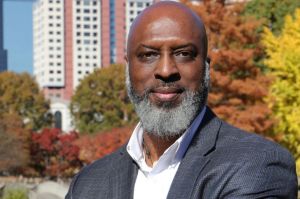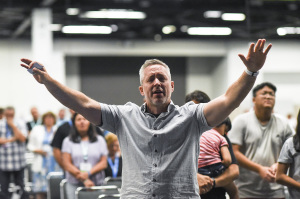A New Third Way? Reformist Evangelicals and the Evangelical Future
Who is and is not an evangelical? With whom should evangelicals cooperate in Gospel efforts, and who not? What theological expressions are truly evangelical, and which are beyond the pale?
These questions are central to the ongoing crisis of evangelical identity. In 1989, Carl F. H. Henry spoke to the urgency of answering these questions:
The term “evangelical” has taken on conflicting nuances in the twentieth century. Wittingly or unwittingly, evangelical constituencies, no less than their critics, have contributed to this confusion and misunderstanding. Noting could be more timely, therefore, than to define what is primary and what is secondary in personifying an evangelical Christian.
But, just a year after Henry offered those words, Robert Brow called for a complete transformation of evangelical theology – and did so within the pages of Christianity Today, the flagship periodical once edited by both Carl Henry and Kenneth Kantzer. Brow’s manifesto was a clarion call to abandon the Augustinian-Reformation model in favor of a new Arminian and postmodern model. Brow declared that the intellectual context of postmodernity made such an exchange necessary. He argued that doctrines such as the omnipotence, omniscience, and sovereignty of God would have to be radically reinterpreted in light of current thinking. He explicitly rejected doctrines such as the substitutionary atonement, a penal understanding of the cross, forensic justification, and imputed righteousness. With remarkable boldness, he called for the rejection of the traditional doctrine of hell and he denied both a dual destiny after judgment and the exclusivity of the Gospel. As he made these demands, he informed his readers of the inevitability of an evangelical “mega-shift” because, “a whole generation of young people has breathed this air.”
In short order, Brow was joined by Clark Pinnock and a corps of fellow revisionists who called for a thoroughgoing reformulation of evangelical theology from top to bottom. Pinnock would call for the embrace of what he would call the “openness of God” – his own version of a radical reconstruction of theism. Pinnock argued that the traditional evangelical doctrine of God is overly dependent upon Greek philosophy. In the style of Adolf von Harnack, Pinnock attempted what he styled as a radical de-hellenization of Christian doctrine. He explicitly denied the omniscience of God by arguing that God cannot know the future decisions of free human creatures.
With Brow, Pinnock called for the affirmation of “creative love theism” in the place of traditional theological frameworks. This new model of theism would redefine all doctrines in terms of a radical human libertarianism and a denial of any direct mode of divine sovereignty. They replaced the traditional understanding of divine sovereignty with an affirmation of divine “effectiveness” – an “ad hoc sovereignty.”
Pointedly, they also rejected the exclusivity of the Gospel of Christ, arguing that evangelicalism had long been captive to a “fewness doctrine” that slanders God’s character. There was more, of course. The ontological trinity was denied and the inspiration of the Bible was redefined in an effort to avoid inspiration being “over-supernaturalized.”
Similar calls were issued by Stanley Grenz, among others. Grenz called for a “post-fundamentalist shift” in evangelical theology that would re-conceive theology as a practical discipline, rather than as a system of propositional truth. Roger Olson has offered encouragement to the revisionists, even as he has called for the formation of a new center for evangelical theology. More recently, leaders of the Emergent church such as Brian McLaren have called for a rejection of the way evangelicals (and virtually all Christians) have read the Bible’s metanarrative or story line. McLaren does not want to modify the traditional rendering of the story line of Creation-Fall-Redemption-New Creation. He demands that we replace it after “calling the entire scheme into question.”
McLaren does indeed call the entire structure of Christian theology into question, and he eventually dismisses belief in virtually all of the major doctrines of classical Christianity. The Bible is reduced to a “library” of human documents in which we can seek wisdom, but the entire account of the salvation of sinners through the atonement accomplished by the Lord Jesus Christ is dismissed as an erroneous reading of the biblical tradition.
I would argue that evangelicalism is marked by a desire to establish a conscious and genuine continuity with the classical, biblical, and orthodox Christian tradition. It is by now apparent that the reformist evangelicals are not actually calling for a reformation of evangelicalism as a movement of conscious continuity with the classical Christian tradition. At least some of them are calling for the abandonment of the very theological foundations upon which the evangelical tradition was established.
The old “two party” system of American Protestantism recognized the polarities of Protestant Liberalism, on one end, and Evangelicalism, at the other end. In terms of the larger culture, little distinction was made between Evangelicalism and Fundamentalism within the conservative party of Protestantism. The early evangelicals did not seek to abandon the classical Protestant paradigm, and they made this abundantly clear in almost every way imaginable. They rejected the limited theological preoccupations of some fundamentalists, their withdrawal from theological and intellectual engagement, and the development of battle lines over secondary and tertiary issues.
But the founders of the evangelical movement sought only to defend the crucial doctrines of biblical inerrancy and infallibility, the plenary verbal inspiration of the Scriptures, the Nicean and Chalcedonian consensus on Christology, the substitutionary character of Christ’s atonement, and the entire structure of the classical Christian tradition. They saw themselves as protecting this doctrinal inheritance from marginalization on the right and from accommodation on the left. They feared that Fundamentalism was fighting over many of the wrong issues even as the liberals were tearing down the house.
The emergence of revisionist or reformist evangelicals raises all the questions of evangelical identity anew. Put bluntly, their proposals amount to what can only be described as a new form of Protestant Liberalism. Their proposals, though informed by various intellectual movements that emerged in recent decades, are really quite at home within the world of Protestant Liberalism that the early evangelicals explicitly rejected as sub-evangelical.
Those evangelicals painfully and courageously left the mainline denominations and their institutions precisely because those churches and denominations had been lost to liberalism. They left positions, pulpits, and pensions behind as they did what they believed fidelity to Christ and the substance of biblical Christianity required. Now, all that the early evangelicals sought to defend is under sustained subversion from within the movement they gave their lives to build.
A strange new ground has appeared on the theological landscape. A post-liberal movement has emerged from within Protestant liberalism, influenced by post-foundationalist thought and elements of postmodernism. These figures are clearly distinct from the older liberal models they dismiss as hopelessly mired in modernism, but they are not seeking to return to what theologian Edward Farley has called the old “House of Authority.” At the same time, many of the revisionist evangelicals have been deeply influenced by the same intellectual currents. Moving from the right, these reformist evangelicals now meet the post-liberals in something of a new third way in Protestant theology.





























